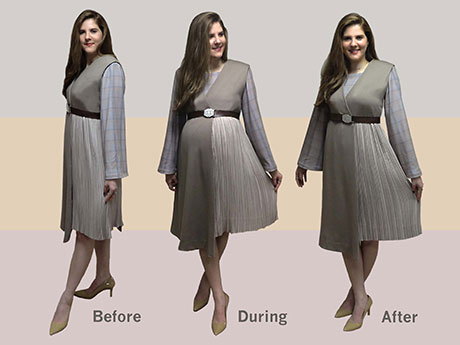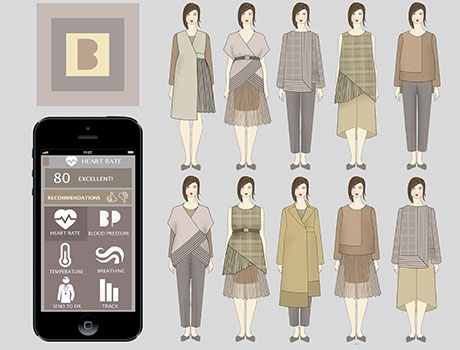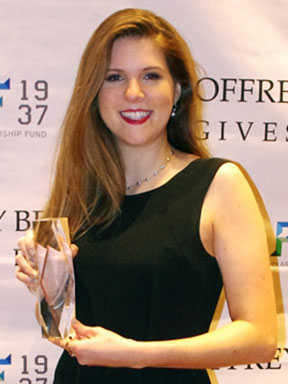Award-winning, stylish clothing tracks mom-to-be's vitals
By Ted Boscia


Pregnant women shop for fit, comfort and style, but Cornell fashion design student Blake Uretsky ’15 has delivered a whole new look: chic maternity wear that wirelessly monitors the mother’s health.
For her wearable tech concept, Uretsky earned one of four $30,000 Geoffrey Beene national scholarships from the YMA Fashion Scholarship Fund, a nonprofit founded in 1937 to support promising fashion designers and entrepreneurs. Uretsky received her prize from New York Yankees legend Mariano Rivera at a star-studded gala Jan. 7 in New York City.
For the competition, Uretsky created a mix-and-match collection of dresses, slacks, coats, blouses, skirts, sweaters and formalwear branded “B” Maternity Wearables that use conductive silver fibers to sense heart rate, blood pressure, body temperature and respiration levels from an expectant mother’s skin. Tucked behind a “B” belt buckle, a device feeds the data to her smartphone, where she can instantly check vitals, receive alerts for overexertion, inactivity, elevated stress and other dangers or email her status to her doctor.
“Wearable technology products must both be aesthetically pleasing and have meaning and value to users, and pregnancy is a time where critical monitoring is necessary,” said Uretsky, a senior in the Department of Fiber Science & Apparel Design (FSAD) in the College of Human Ecology. “I also wanted to change negative views associated with maternity wear by showing that it can be stylish, professional and trendy.”
Uretsky’s ideas gestated for more than seven months, as she investigated the $4.8 billion maternity wear market, specialty fabrics, wireless technology and marketing concepts while she sketched, computer-modeled, draped and sewed her prototype garments. As part of her design research, she surveyed 30 pregnant women, including 10 face-to-face interviews, and even browsed and tried on maternity clothes for fit, quality and design while wearing a fake baby bump.
In addition to health monitoring, Uretsky said her collection stood out because it can be adapted as a woman’s body changes, paired with a variety of components and worn before, during and after pregnancy.
“My three unique design features of reveal and conceal, grow with you, and mix and match provide pregnant women with the style and versatility they desire,” added Uretsky, who donned her replica belly and maternity wear for the competition’s final pitch to seven fashion industry judges.
Uretsky credited FSAD associate professor Van Dyk Lewis and senior lecturer Anita Racine with guiding her fashion design concepts, and the department’s fiber science experts with help assessing high-tech fabrics.

“As a young fashion designer, Blake went well beyond what was required in this case study to research the current maternity wear market and address women’s clothing needs with a goal to help them feel both healthy and beautiful during pregnancy,” added Racine.
Following Justine Lee ’14 in 2014, Uretsky is Cornell’s second consecutive winner of a Geoffrey Beene national scholarship and fourth in the past seven years. In addition this year, Cornell FSAD students Eric Beaudette ’16, Nicole Cember ’16, Sydney Conner ’16, Megan Rodrigues ’15, Samantha Stern ’17, Hannah Wheeler ’16 and Laura Zwanziger ’15 earned $5,000 awards for their YMA Fashion Scholarship case study entries.
“Winning the award means so much and will create so many new and exciting opportunities for me to further drive my passion for design,” Uretsky said. “I have learned and experienced so much throughout this process that I could not have any other way. This extremely generous scholarship will go toward the development of my own fashion label in the near future.”
Ted Boscia is director of communications and media for the College of Human Ecology.
Get Cornell news delivered right to your inbox.
Subscribe